Andrew Collins's Blog, page 28
December 16, 2012
You don’t have to be Mads to work here
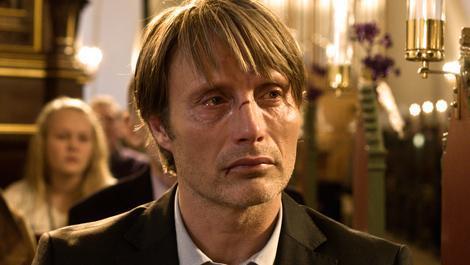
It’s that time of year. A time when our thoughts turn inexorably to the real reason we celebrate Christmas, which is: coming up with our Top Tens. I’ve already been asked by Radio Times to supply my Top Ten Films of 2012, so that a collective best-of can be collated for the website. But I felt ill-equipped to do so. Not because I haven’t seen most of the key films of the year. I have. But because as of Friday, when I was forced to compile my list, there were at least three new films on release that I hadn’t seen but predicted would make the cut: Amour, Sightseers and The Hunt.
Well, I got my ass in gear and saw The Hunt on Saturday. Guess what? It’s one of my Top Ten Films of 2012. (Bad luck, Skyfall, which may just get nudged out of my original ten.) I know what you’re thinking. A Danish film. If I like Denmark so much why don’t I got and live there? Well, I would, but maybe not to the kind of close-knit, almost primeval rural Danish hamlet Thomas Vinterberg depicts in this evocative but subtly terrifying drama. Its setting is far away from the sleek, sophisticated world of coalition politics and grand office buildings seen in Borgen, The Bridge and The Killing. We’re talking about a place where everybody knows each other. And where one man’s life can be turned upside down.
Vinterberg, one of the original Dogme 95 founders, is still best known for 1998’s Festen, in which a family gathering in an august hotel is rent asunder by the revelation that a patriarch had abused two of his children. It’s a pretty devastating piece, yet shot handheld on DV under strict Dogme dogma, which gives it a fly-on-the-wall quality that’s become commonplace. (If you’ve seen it, you won’t have forgotten it. And if you remember the youngest son, played by Thomas Bo Larsen, he’s in The Hunt.) I haven’t seen any of Vinterberg’s subsequent works, a couple of which have been in English and I think most of which have been flops. Either way, The Hunt seems to have put him back at the top table, for good reason.
Mads Mikkelsen, the Easter Island statue-faced leading man who plays a divorced primary school teacher who’s clearly brilliant with kids but who gets wrongly accused of inappropriate behaviour with one of them, has already been in one of my favourite films of 2012, the Dansk costume drama A Royal Affair. He’s also done quite a bit of super-mainstream Hollywood crossover in the likes of King Arthur, Clash of the Titans and Casino Royale. But this is being talked about his best performance so far, and it won him props at Cannes. (His brother, Lars, was Troels Hartmann in The Killing.)
The subject of child abuse, and the suspicion of child abuse, is becoming a popular one for “issue”-based fiction. We’ve seen convicted paedophiles played by courageous, well-known actors including Matthew Macfadyen (C4’s Secret Life), Kevin Bacon (The Woodsman) and Jackie Earle Haley (Little Children), but Lucas in The Hunt is different: he’s innocent. This is not a spoiler, as the accusation is made early on, and we, the audience, are left in no doubt that he didn’t do it. This is The Hunt‘s underlying masterstroke. It’s not about child abuse, but it is about the moral panic that surrounds it in this day and age. (If it was set in the 1970s, you might argue that there would be no drama, and no film.) I won’t delve too far into the plot, but Bo Larsen plays Lucas’s best friend, and the father of the child who makes the life-changing accusation, and his work in the film is equal to Mikkelesen’s.
I loved the way Vinterberg, who co-writes with Tobias Lindholm, plunges us into the rough, tough, ritualistic way of life in the unnamed town, with an annual dip in an icy-cold lake by this hermetically-sealed community’s menfolk, many of them hairy and big, like bears. It is as if these creatures are, like the wildlife they hunt with guns, of the forest that encircles their world. The men are seen roaring and drinking around a table after bagging a stag, like primitive men. They are no less likeable for it, but we are glimpsing a species closer to the earth than the fancy types who live in Copenhagen. They seem honest and hardworking and loyal. And yet, at the first whiff of wrongdoing, they turn nasty. And Lucas finds himself at the sharp end.
You’re reminded of Straw Dogs, even though Lucas is not some speccy intellectual cast among savages; he’s one of them. But his alleged crime casts him out of the circle of trust, and if they don’t actually take up flaming torches and run him out of town, you feel it could happen at any moment. The Hunt is not a horror film, or a thriller, in the conventional sense of either, but it is horrific, and thrilling. It’s also darkly amusing in places. And surprisingly moving.
Because of the times we are living in right now, especially in this country after Savile, the very idea of a film about accusations of inappropriate behaviour towards children might seem inappropriate. It’s certainly problematic that it centres around an unreliable accusation made by a child. (The reasons for the accusation are complex, but very convincingly and subtly built up. The child is not portrayed as vindictive or bad, just confused and misunderstood – and is admirably played by Annika Wedderkopp. It’s the system that seems at fault in this world, not the people.)
Never mind my soft spot for Scandinavian drama (oh, and fans will recognise Bjarne Henriksen aka Theis Birk Larsen from The Killing as a social worker), The Hunt is quite an achievement: to take a prickly subject matter and press it into service not as an issue-of-the-week but as a motor for exposing the fragility of friendship where children are concerned. It takes a lot of courage to do this, and a lot of skill to set up a smalltown witch-hunt that never strays into melodrama. There’s a scene in a church that doesn’t play out like its equivalent in a Hollywood movie would. And a scene in a supermarket that avoids the same nest of clichés. Even the use of the deerhunt motif itself is surprising.
Right, now, if I can just fit in Sightseers and Amour, my Radio Times Top Ten can be further decimated.


December 11, 2012
For each a road
 After the unusual step last week of trailing something – The Fear on C4 – you’ll be glad to know that I actually review this week. (We record this on a Monday afternoon and the first of four episodes aired on Monday night, running to four consecutive nights thereafter.) In the event, I’m rather surprised to say that Telly Addict seems to be going out on a limb here in praising The Fear to the rafters, as it was rubbished in many quarters. I was also a fan of the first episode of ITV1′s The Town, by playwright Mike Bartlett, also less so of A Young Doctor’s Notebook on Sky Arts 1, albeit mainly due to a disconnect between me and Russian humour, as it’s based on the semi-autobiographical short stories of Mikhail Bulgakov. Oh, and further mention of ITV3′s re-runs of Man About The House, which are an ongoing pleasure.
After the unusual step last week of trailing something – The Fear on C4 – you’ll be glad to know that I actually review this week. (We record this on a Monday afternoon and the first of four episodes aired on Monday night, running to four consecutive nights thereafter.) In the event, I’m rather surprised to say that Telly Addict seems to be going out on a limb here in praising The Fear to the rafters, as it was rubbished in many quarters. I was also a fan of the first episode of ITV1′s The Town, by playwright Mike Bartlett, also less so of A Young Doctor’s Notebook on Sky Arts 1, albeit mainly due to a disconnect between me and Russian humour, as it’s based on the semi-autobiographical short stories of Mikhail Bulgakov. Oh, and further mention of ITV3′s re-runs of Man About The House, which are an ongoing pleasure.


December 6, 2012
Drinking outside the Bucks
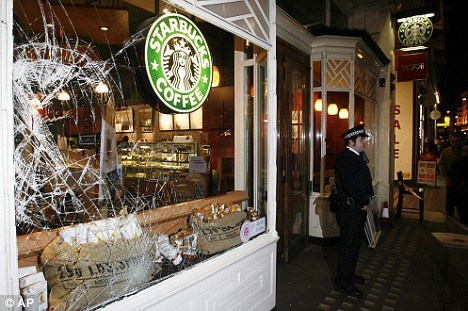
If I was less busy trying to earn a living, I’d blog every time I had a passing thought that I wanted to solidify, get down and expand upon. Because I don’t have the luxury of spare time at the moment, I often take to the immediate medium of Twitter and type sentences that, at best, come out as pithy aphorisms and, at worst, cheap slogans. I wrote this about Starbucks and the corporation’s notorious UK tax-avoidance doctrine on Monday morning. I enjoyed typing it.

As you can see, its deft combination of jokey tone and serious message struck a chord with 99 people, who passed it on. (Like Oscar Wilde in a donkey jacket, I cooked it up while walking past a Starbucks that morning and wondering what the patrons inside it thought about the economy they were in.) However, once you’ve dropped a pith-bomb and you are followed by more than a manageable number people, you must expect a percentage of antagonistic responses from people you have never met and will never meet, most of them reasoned and fair, one or two of them simply patronising, insulting, or borne of what seems like misunderstanding for furious effect. I sincerely believe in the power of the consumer. It is the predominant power we have as individuals when there’s not an election taking place.
If we accept – without prejudice – the reality that big business runs the world, because it does, and that politicians largely do the bidding of big business, whether by oiling the wheels, relaxing regulation or, more fundamentally, running an economy based on “growth”, which naturally favours more business and never less, then unless we are on the board of a large global corporation, we live in a world shaped by large global corporations.
Starbucks, which began as a local store in Seattle in the early 70s, arrived in this country in 1998 and, through a successful programme of aggressive expansion, it quickly made a mark on our high streets. A Starbucks coffee was probably the first takeaway coffee I’d ever gone out of my way to buy, not really being a coffee drinker at that point, and certainly no connoisseur. I enjoyed the drink, albeit mostly the fluffed-up milk, and the relatively new experience (“experience” being the key to the brand’s success, of course). The proliferation of Starbucks, followed by the others that bloomed in its wake, did indeed change the way a nation of tea drinkers viewed coffee. You have to hand that to them. But this soon went sour.

Before I could settle into a new routine of buying lattes on my way to Broadcasting House, for instance, I read Naomi Klein’s No Logo and my head was turned. Overnight, I despised Starbucks for the way it did business, along with what had become the new usual suspects of corporate greed, sharp practice, exploitation, non-unionisation and bullying: Nike, Gap, Coca Cola, Wal-Mart, McDonald’s, you know the drill. I have, in my adult life, given money to some if not all of these corporations. I am not a saint.
But when I feel a boycott is called for, I only have my own conscience to deal with. And the recent exposé of Starbucks’ tax affairs in the UK, the payment of which has been deftly avoided by sleight of hand involving licences, the Netherlands and declaring losses, has put the chain in a lot of people’s sights. It may be that pressure from the MPs – led by Margaret Hodge – who sat on the select committee flicked the switch, and forced the corporate hand into face-saving reparationary action, but it was surely the fear of loss of custom and attendant share price threat that sealed the case.
Give or take the odd exception since 1999, I’ve hardly given any money to Starbucks, so they won’t have noticed my total blanket boycott since the Reuters report into their UK tax-avoidance, but as I always say, if enough people make what seems like a futile gesture, it might just amount to a meaningful one. I once read an interview with Klein, in which, admirably, she admitted to occasionally grabbing a Starbucks if it was the only concession in an airport, say, and she really wanted a coffee.
I admired her candour. It’s easy to avoid Starbucks in any UK high street, as there’s usually another chain nearby, if not an independent outlet. (I understand that Whitbread, the UK hotel and restaurant firm, which owns Costa, pay their full UK corporation tax, so if you must use one of them … ) However, that’s not what I intended to blog about. I was more interested in the nature of the way Twitter extends a dialogue, and why it’s foolhardy to do as I do, which is type in cheap slogans.

Having published my call-to-arms on Twitter on Monday, I spent way too much of the following days counter-arguing my case with nitpickers and, in some cases, outright apologists for corporate tax-dodging. (There was also one rude bastard who began his reply, “FFS, wake up, man …”, which guaranteed him a blocking. As Billy Bragg says, freedom of speech comes with the freedom not to have to listen.) Most people hit back along the lines of, “Don’t boycott Starbucks; pressure government to close tax loopholes and force HMRC to hit the corporations harder.” This rather assumed that in being angry with a corporation, I was fine with HMRC’s timidity and failure to act, and with the government’s protectionism with regards tax loopholes. I’m not fine with it. (Oh, and I’m not angry with the people who work at HMRC, like the wife of one affable plaintiff on Twitter – “she’s lovely” – I’m angry with the management.)
So, that’s that argument dealt with. Others reckoned my boycott will only harm individual franchises who do pay tax, and throw ordinary, hard-working UK baristas out on the street. Nobody actively wants this. But in the same way, let’s say boycotting a bank because it invests in murderous regimes might ultimately affect those blameless individuals working in the bank who have no control over what their corporate employer does with its money. This kind of joined-up thinking is always enough to push you to the conclusion that it’s better to do nothing. Most people, after all, do nothing. (Except in Syria. And Egypt. And Palestine. And Greece. And so on.)
Other people – nigglers, really – said that if you’re going to boycott one corporation you have to follow through and boycott all corporations who avoid tax, and then they list the other offenders. Hey, the BBC have been caught out encouraging their contracted stars to set up limited companies, through which they are paid, thus reducing tax on both sides, so surely, if I’m so bloody righteous, I should boycott the BBC, too! (And my friends who are contracted BBC employees! Presumably by altering my Christmas card list?) Again, if you tie yourself up in knots, you will end up doing nothing. “They” would much rather you did nothing. We got into this recession by running up credit, and “they” seem to wish us to spend out way out of it by running up even more credit. Where will it all end?
I do not believe in criminal damage, so will not be smashing Starbucks’ windows in. I think UK Uncut’s planned series of civil disobedience sounds admirable, and witty and clever – turning coffee outlets into refuges for women, and creches, which are the worst hit by the cuts, which are linked to our failing economy, which is linked to the very rich not paying their fair share and being given a tacit blessing to Carry On Avoiding, so I’ll be interested to see how that works out tomorrow.
Having just spent a couple of days with Billy Bragg, researching a new chapter for his official biography, I am dangerously fired up with progressive left-wing ardour. His message these days is simple: it’s all about accountability. I’m cutting down on caffeine anyway.


December 4, 2012
Channel for …
 Having failed to mark this year’s 30th anniversary of the launch of Channel 4, Telly Addict compensates by featuring two shows that ended last week in fine style: the second series of Fresh Meat, which has long since left the description “sitcom” behind, and the one-off four parter Secret State, which dragged A Very British Coup into our current, centre-everything age of corporate takeover. There’s a throw-ahead to C4′s next big thing, The Fear, which of course started last night, after we’d recorded Telly Addict, and thus will be dealt with next week. And Michael Portillo’s charming Great Continental Railway Journeys on BBC2, because not everything can be Channel Swore (as the papers branded it, 30 years ago).
Having failed to mark this year’s 30th anniversary of the launch of Channel 4, Telly Addict compensates by featuring two shows that ended last week in fine style: the second series of Fresh Meat, which has long since left the description “sitcom” behind, and the one-off four parter Secret State, which dragged A Very British Coup into our current, centre-everything age of corporate takeover. There’s a throw-ahead to C4′s next big thing, The Fear, which of course started last night, after we’d recorded Telly Addict, and thus will be dealt with next week. And Michael Portillo’s charming Great Continental Railway Journeys on BBC2, because not everything can be Channel Swore (as the papers branded it, 30 years ago).


November 29, 2012
Enjoy this Tripp

Before I start, let me first credit this glorious illustration, commissioned in 1979 for Look-In magazine, to Arnaldo Putzu, who sadly died in September this year but who leaves behind a treasure trove of, primarily, movie posters from Carry On to Get Carter. While searching for a still to illustrate this blog about Man About The House, I found it on a site that sells original illustrations called The Illustration Gallery, who should also be credited, although they have sold the original painting (acrylic on board, 550cm x 650cm), and I am now filled with jealousy towards whoever owns it.
Now that you know how much I love BBC4′s weekly re-runs of Top Of The Pops shows from the 70s, if I tell you that I’m also hooked on daily re-runs of Man About The House on ITV3, you’d be within your rights to shout, “If you like the mid-to-late 70s so much, why don’t you go and live there?”
Well, I do have a soft spot for the era, because it’s when I grew up, and both shows were fixtures in my house. In fact, we watched all the sitcoms of what is now considered a golden age for British comedy, from Are You Being Served and Dad’s Army to On The Buses and Love Thy Neighbour. I wasn’t really aware of it, but Man About The House was a little hipper than all of the above. It was about younger characters, who lived in trendy London (Kensington, in actual fact, which is weird now that I am a London native of almost 30 years; all I can say is that it can’t have been as chi-chi and Sloane-colonised in the 70s as it is now). Writers Brian Cooke (still with us) and Johnnie Mortimer (sadly, not) were cartoonists who’d worked together on Round The Horne, but I think Man About The House was their first big TV smash. They wrote every all six series – comprising six or seven episodes each – which ran between 1973 and 1976, two series a year, mostly.
The set-up was controversial for the time: a guy sharing a flat with two girls, neither of whom he is going out with, although not for want of trying. Richard O’Sullivan is perfect as the catering student, Robin – who went on to run his own bistro in the equally good, but at times woefully unconvincing Robin’s Nest – cheeky and likable enough to carry off what might have come off like simple lechery in the hands of a lesser actor. (Compare and contrast with the late Doug Fisher’s Larry – Robin’s slightly rougher and readier pal – whose “phwoooargh“-based attitude to women is far more bottom-pinching and bit-of-stuff in comparison.) Because Robin is matched against two women, Paula Wilcox’s self-improving Chrissy, and Sally Thompsett’s frankly ditsy – but equally Robin-resistant – Jo, he is always on the back foot, and the general air of sexism is always countered with genuflections towards feminism.
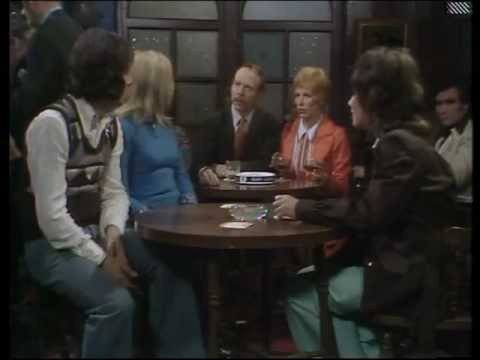
Perhaps the most interesting relationship is that of landlord and landlady George and Midred Roper, who live downstairs – and also landed their own spin-off series, George & Mildred, which, I can vouch, is just as watchable 40 years on, albeit more predicated on class than sexuality. Although Mildred falls broadly into the archetype of battleaxe, while George is the pathetic, henpecked husband, it is she who’s the sexual predator, and he who has a headache. In one episode I’ve just seen, he makes some home brew and gets all tiddly, and, for one time only, suggests the “early night”. Mildred is a new woman the next morning. This certainly turns the truism of the sex-starved male and the disinterested female on its head, and provides constant laughs.
I don’t wish to write an academic essay on the show. I like it because a) it’s still funny, if crudely staged and sometimes too broadly acted (you will be lucky to spot a supporting actor who went on to do anything of note, outside of the great Roy Kinnear, who was way too good to be playing a one-note layabout like Jerry), and b) it’s a fascinating snapshot of a changing society. Women were definitely still regarded as objects to be lusted over, and their advances in terms of career and independence were frankly regarded with suspicion. But Robin needs Chrissy and Jo more than they need him. They find him sleeping in the bath after a houseparty in the first episode and he ends up filling the rent gap left by a departed flatmate, largely because he’s a great cook. More turning of the tables. They tell the Ropers he’s gay initially, so that they won’t object to him cohabiting with two “birds”. And again.
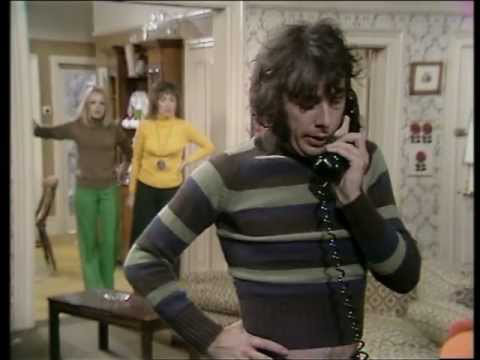
Just as the formerly inoffensive sight of Jimmy Savile in a clip of Top of the Pops will now be viewed through a prism of suspicion and afterknowledge (if they are viewed at all), so with any comedy of the 70s, the modern viewer will continually encounter humour that has been almost entirely discredited by what I like to think of as the 1980s enlightenment. Despite the progressive use of homosexuality in the first episode, any further exploration of this area amounts to little more than the occasionally pursed lips and limp-wristed gesture from Robin or Larry. It’s not exactly gay-bashing, but it adds to the discussion not a jot. Similarly, in a recent episode, there was a rape joke, and guess what, it was Chrissy who made it, and not Robin. You are taken aback by these relics from a less informed age, but it is silly to call for retroactive censorship, just as you have to leave the name of the dog in The Dambusters. (He was called Nigger. It’s problematic to our sensitive ears but it’s a fact.)
The most important thing is that there’s a joyful simplicity about 1970s sitcoms. Unlike the intricately plotted nature of even more mainstream sitcoms today, these approximately-23-minute ITV episodes usually just end, often on a fairly weak punchline. The form was in its prime, and yet, with no sitcom filmed “single camera” in those days, no efforts were made in the direction of realism. These were like farces from the stage, with characters entering through doors and exiting through doors, and scenes beginning at the beginning and not halfway through conversations. All that said, studio sitcoms of today still use these devices. Having worked on many episodes of Not Going Out, in which – hey! – a man shares a flat with a woman he fancies but cannot have, I have been co-responsible for many gags which hinge on the fact that their front door is left open so that another character can wander in at will. (George and Mildred knock and enter, which is convenient, but so does Kramer in Seinfeld.)
“Sitcom” means many different things in 2012: Hunderby, Mrs Brown’s Boys, Twenty Twelve, Benidorm. In 1975, it meant one thing, and Man About The House is an intriguing example of that thing. O’Sullivan, as is well known, was laid low by a stroke a few years ago and lives in a retirement home for old actors. Paula Wilcox has enjoyed the sort of later-blooming renaissance she deserved, with older parts in shows like The Smoking Room, Rock & Chips and (though I hate to mention it) The Green, Green Grass. While Sally Thomsett, who I’ve just said hello to on Twitter, retired from acting after the Man About The House film (slightly saucier than the telly, but at least it featured the whole principal cast), but clearly loves having been in such a beloved show. She’s currently enjoying the re-runs being on, and so she should.
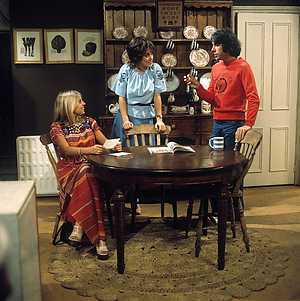
I just wished to mark my appreciation. I love modern comedies like Fresh Meat and Rev and Girls, which play with expectations of TV comedy, and pull it into new shapes, but, with this show and George & Mildred providing the templates for successful US shows, Three’s Company and The Ropers, I’m hardly going out on a limb in naming Man About The House a bedrock contribution to television.
Oh, and put “Arnaldo Putzu” into an image search and see what wondrous works he made.


November 27, 2012
Rundown
 Uniquely to this week’s Telly Addict, I turn the oblong in which my head and shoulders have appeared on a weekly basis since April 2011 into a soap box, and launch a campaign to save Top Of The Pops on BBC4. Hmm? But Top Of The Pops was axed in 2006. I know, but BBC4 have – as connoisseurs of popular cultural history will know – been running unedited editions of the chart show from 1976 and 1977, on a weekly basis, since last April. And now the channel is considering ending what ought to have been a 30-year experiment in real-time Top 30 rebirthing.
Uniquely to this week’s Telly Addict, I turn the oblong in which my head and shoulders have appeared on a weekly basis since April 2011 into a soap box, and launch a campaign to save Top Of The Pops on BBC4. Hmm? But Top Of The Pops was axed in 2006. I know, but BBC4 have – as connoisseurs of popular cultural history will know – been running unedited editions of the chart show from 1976 and 1977, on a weekly basis, since last April. And now the channel is considering ending what ought to have been a 30-year experiment in real-time Top 30 rebirthing.
You can see why. Savile. DLT. These regular hosts have already been rubbed out of history – the latter, like his Magic FM show, until the matter is “resolved”. But surely this is not reason enough to nix the whole thing? Edmunds, Powell, Stewart, Jensen, Blackburn … these men are not accused of being part of Savile’s ugly shadow world. And nor is the show itself, whatever one hideous, predatory individual might have done within its corridors and dressing rooms. You might just as well erase all footage of shows made at Television Centre while Savile was alive.
Anyway, for this reason, Top Of The Pops is one of the programmes under review this week, along with the return of Peep Show for its eighth series on C4, the brilliant one-off Bradley Wiggins: A Year In Yellow on Sky Atlantic, and the indulgent Stephen Fry: Gadget Man on C4.

November 25, 2012
The OK foundation

It can be told. Last Tuesday night, in the Main Hall of the Maidwell Building, at the Avenue Campus of the University of Northampton, the frankly legendary Bill Drummond and I gave a joint lecture to students and paying customers as part of the Articulation series of events, curated by Associate Fellow of the university John Harper, who taught Bill in 1971 when he did the one-year foundation art course on this very site, and who taught me in 1983 when I did the one-year foundation art course on this very site. The experience changed both our lives forever and set us on very different paths through art, music and the media, converging occasionally along the way. We both give thanks for that formative experience.
It was John, always a force of nature, who inspired us both, 12 years apart, and who had the momentary lapse of reason to suggest we join forces for one evening under what was a fairly hastily conceived umbrella: Art Vs Art. John’s first, insane optimstic email was sent to both of us at just after midday on May 14 this year. By 3pm that afternoon, we had both said yes, and a date was fixed – far enough into the future to seem conceivable. (For the record, although a long-standing fan of his various works, I had only met Bill on one occasion, although it was to interview him on 6 Music in 2008 for his terrific book 17, so we had, it seemed, bonded sufficiently.)
Over the ensuing months, the three of us pinged emails back and forth, in search of some kind of shape for this live event, which remained amorphous but hopeful even after the tickets had gone on sale. Bill and I had been photographed, for the 6 Music album, in 2008, and this unique shot was all we had for publicity, so out it went into the world.
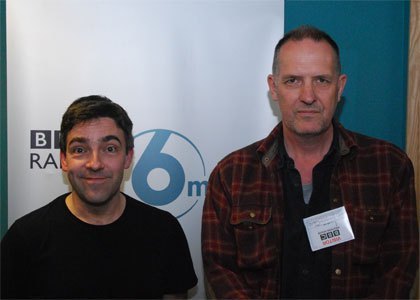
In it, you can sense the disparity in height (I look up to him etc.), and in attitude. My grinning inanity compares unfavourably with Bill’s authoritative gravity. But there it was.
Over the ensuing five years – five years! – the parting in my hair would change sides, and I would stop wearing black t-shirts that were already frankly inappropriate for a man in his 40s; while Bill would remain pretty much the same. He’d already found his visual brand.
The passage of time turned out to be key to our lecture. (Was it a lecture? Or was it too men talking about themselves? Maybe it was both.) John Harper had caught us both at an impressionable young age, a decade apart, and, as Bill stated, the course at what was then a technical college and years away from attaining university status taught him “not just to look, but to see.” For me, it broadened my artistic palette, and gave me the freedom to express myself in new ways. I’ve always thanked art school – both Nene College, as it was in 1983, and Chelsea School of Art – for exposing my obsession with drawing cartoons for the commercial outlet it was, allowing the act of writing to take over as my creative impulse. I used to draw cartoon strips. But it was the writing in the bubbles and the captions that turned out to be my calling. (God, let’s hope so, as without practice, my drawing ability has withered.)
Now, photographs were taken. The big one above is a phone shot of the sign outside the building, which I intend to relegate and replace with one of me and Bill, when one is supplied. In the meantime, I only have photos of me and John. Thanks to Fiona Cordingley for supplying these. They’re very good.
Here though is a nice shot of John introducing us. He is hiding behind a photocopied shot of him as a younger man in the 70s; more passage of time. When I arrived at Nene, aged 18, he blew my mind, with his fine art sensibilities and empowering “schemes.” (“What’s the scheme?” he would inquire of his students – not always a question you could answer.)

The “scheme” turned out to be tag-lecturing. Bill (just out of shot, to the right) would tell a relevant anecdote. Then I would tell one. Thinking on our feet, we found hooks and references in each other’s ramblings to feed back into our own. It must, at times, have seemed to the excellent, attentive, wide-age-ranged, in-tune audience of a couple of hundred as if we had planned it all out. Here, you can see my slipping the first JAMs 12″, All You Need Is Love, onto the turntable we asked for. It was fun to be able to go and rummage through my bag-for-life while Bill held the audience’s attention and cue up a vinyl record. Music was our first love, after all. Before art.

I hadn’t warned Bill I was going to play one of his records. (I didn’t even know I still had it until I checked my single flight-case of 12″ vinyl before heading down up to Northampton, and really only played it to illustrate a later point about how much power the NME had over us in the 80s: I read about the record and bought it without having heard a note of it – something unheard of in the download age.) It was the one point in the evening where Bill seemed flustered. Not because he minded me playing it, but because he feared the audience might expect him to riff on his pop career, which he has no interest in doing. We got through it, don’t worry.

In the photo above, subliminally influenced by the guerilla art of Bill Drummond, I have emptied out onto the floor a folder full of my commercial illustration work from 1987-88, after I’d graduated, and during which “pay the rent” period my creative urges were satisfied not by my work, which was soulless and supplied by the yard, but by rustling up my own fanzine and writing and designing it, ready for Kall Kwik. So, indirectly, the soulless art pushed me in the direction of what would be the first rung on another career entirely, one that was driven by art, albeit soon subsumed by the imperatives of commerce. It is a career whose story has been told many times, so I won’t repeat it here.
Tuesday happened also to be my Dad’s birthday, and he came along to the talk, meeting Bill over a fruit plate and two doughnuts in a gallery space which became our de facto “green room.” The age difference between Bill and my Dad is about the same as the age difference between Bill and me, so we got on fine, the three of us. (Dad had rather sweetly looked Bill up on Wikipedia in the afternoon – research!) The combination of my – our – alma mater, the curatorial joie de vivre of the infinite John himself and the presence of my father made Tuesday a very special night indeed. I’m so glad we agreed to do it, against all odds. Perhaps this is how all visiting lecturers should be forced to operate, by being thrown together with another visiting lecture and making it work on the hoof. I sincerely hope that the audience felt they had not wasted their evening. I certainly hadn’t.
Bill’s climactic section involved him donning a high-viz tabard and a bespoke Homburg, and living out his fantasy of being a superhero street sweeper. This was a routine he’d clearly done before, and it was a fitting end to what turned into a two-hour talk, as he swept the stage with his broom. Much of the detritus that required sweeping was, as seen, a pile of my own work. Which was fitting. We couldn’t have planned it better if we’d planned it.
I hope to return to the University of Northampton soon, although, in the future, it will up sticks and easels and move to a new site, and will no longer sit hunkered around the old building into which both Bill and I tentatively stepped in 1971 and 1983, respectively. But it doesn’t do to be nostalgic. Bill and I were ancient, and justified, to varying degrees, and have both done varying degrees in big cities other than Northampton, but it was good to be back.

November 23, 2012
Writer’s blog: Week 47
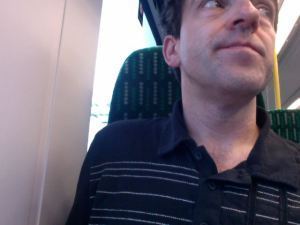
Wednesday
I give up. I don’t know what week number it is. Anyway, we’re hurtling toward December, I know that much, it’s Wednesday, and the heat is on at the Pappy’s sitcom for BBC3, Secret Dude Society (the working title seems to have almost hardened into a title, but not fully so hold your horses for a bit longer). As I type, I’m currently on the East Midlands train, more literally hurtling back to London Euston from Northampton for a full day’s script meeting with “the boys” – Matthew, Ben and Tom, who are not boys – our fastidious Scottish bosses Gav and Rab from Glasgow’s illustrious, industrial estate-based production company The Comedy Unit, and producer Izzy (with whom I previously worked on the cruelly cancelled Gates for Sky). I am, as previously stated, script editing the six-episode series. The onus remains on “the boys” to come up with the goods, which, after all, they will be acting out in a TV studio in February before a live studio audience, but my job is to help pat it into shape. It’s cool to be part of someone else’s first sitcom and to be around a conference table with creative, funny people.
I was involved in a talk at the University of Northampton last night, part of a series called Articulation, a sort of “tag lecture” with fellow alumnus Bill Drummond. I will write about that unlikely and amazing experience once I have the photographic evidence that it even took place.
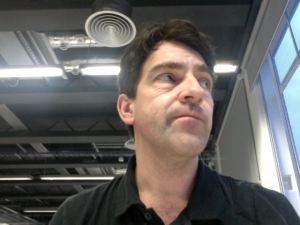
Thursday
I am unnaturally soothed by the repetitive, mundane, always-looking-sideways-off nature of the PhotoBooth pictures I take of myself to illustrate Writer’s Blog. They are spectacularly uninteresting, and reveal little about my physical context (oh, not those ducts at Radio Times again!), but they are honest and true. And they reveal the routine nature of my life. And the occasional fluctuation one way or another in terms of the size of my double chin.
Arrived in London at 10.27 yesterday morning, as advertised (I must admit, I am generally quite lucky on this train from Northampton, the 09.25, which I regularly take after a sleepover at Mum and Dad’s), and joined Pappy’s and co round the circular conference table in a ground-floor conference room at the West Kensington-based media company who own The Comedy Unit by 11.00, unnaturally hot, as ever, after a trudge in too many layers with too many bags. (This time of year is always a conundrum: waterproof outer layer, optional jacket underneath, optional cardigan under that, over shirt … how to strike the perfect, temperature-controlled balance? On Stephen Fry Gadget Man on C4, he demonstrated an air-conditioned jacket, from Japan. I don’t want one.)
With all six scripts at varying stages of completion, we read aloud, and made notes, and shared notes, and made more notes, from 11am-6pm, and ate the traditional platters of M&S sandwiches and sausage rolls (cheese ones for the veggie) while we worked, so as not to waste valuable time. It was, as you can imagine, as hard and tiring as the equivalent time spent working down a coalmine. I still love the fact that the sort of food we eat in the middle of a working day is exactly the kind to ensure a slump, mid-afternoon: bread, pastry, sponge, potato. We are a curious race.
My day at Radio Times today has been focussed. I have had to supply a week’s worth of Film of the Days for the magazine that will hit the armchairs of Britain in two weeks’ time, as we are in “Christmas pick-up”, which is where everybody works super-hard in order to get the famous Christmas double-issue (our biggest seller of the year) out in good time for the festive period, which means foreshortened working weeks in order to pull all schedules forward. (This means that the staff get an actual week off for Christmas, secure in the knowledge that the issues for the first week of the New Year is already “in bed”.)
Arrived home to find that my annual Cats Protection advent calendar had arrived in the post today. You may be unsurprised to hear that this is my favourite charity after Thomas’s Fund, of which I am a proud patron. What can I say? I like cats. It is also an annual New Year tradition to scan the opened calendar, even though it is impossible to do it and let you see inside each door, without removing the doors, which would be counterproductve, as the names of the kits are on the door.

Oh, alright, here’s one where the doors are off. You’re so demanding.

Anyway, it’s good to think of those less fortunate than ourselves at this cold and festive time of year, so spare a thought for those who haven’t been sent a Cats Protection advent calendar.
Read an alarming but expected piece in today’s Media Guardian about BBC4 controller Richard Klein considering axing the currently ongoing, back-to-back Top of the Pops repeats from the late 70s. They’ve had to yank a couple presented by Jimmy Savile in recent weeks, and one presented by DLT, and you can understand why Klein might be nervous about forging on with the initiative into 1978 next year. (After all, even though Kid Jensen, Noel Edmunds, Peter Powell etc. are free from any implication of wrongdoing, it’s the atmosphere of adult male DJs surrounded by fawning teenage girls and introducing the lovely Legs & Co with a glint in their eye that now seems to have curdled with recent revelations.) I love these re-runs – shown in full, unedited, they present valuable social documents, and I hope BBC4 keeps airing them. It’s too easy to edit the past, and these half-hours show 1976 and 1977 as they were, with The Jam rubbing seditionary shoulders with the frankly offensive Barron Knights. Save TOTP!

Watched Sky’s documentary about Bradley Wiggins, A Year In Yellow (can’t imagine why Sky had exclusive access to him … oh yes), and found myself utterly captivated by it, despite my threadbare interest in sport and almost non-existent interest in cycling. Not only did it explain the Tour de France for me – thanks to intelligent and eloquent input from three cycling journalists who were a credit to their trade and chosen sport – it depicted Wiggins in an honest manner. He seems decent, self-aware, dedicated, a family man, averse to fame, a bit shy, a lover of peace and quiet, proud of his tower-block roots (his Nan, who raised him, still lives on the same estate) and committed to the purist notion that he will not leave his wife for a supermodel, nor takes drugs to enhance his sporting performance. I wish him well, and will review this programme, with clips, on next week’s Telly Addict.
 Friday
Friday
Just heard from the University of Northampton that some official photos of my night with Bill Drummond are on their way, so expect a full account soon. I’m off for a meeting with my agent today, what we call a “catch-up”, which is always done face to face. Clearly I can’t give anything away, but I will say this: I’ve had some encouraging news from a particular broadcaster this week about one of the projects I have “in development”, something I’ve developed and written by myself and have invested a lot in. Not a commission, as yet, but not a knockback, or an interminable series of notes, and that in itself is promising.
As mentioned above, but not stated for the record before, Gates has not been recommissioned by Sky Living. I’m sad about this, as I felt we – the team who wrote it – had more stories to tell about these parents and teachers. It is not to be. And there was me thinking everything got a second series on Sky! I can’t remember if I’ve mentioned that Mr Blue Sky – a far more personal project – was not automatically recommissioned by Radio 4, but we’re in the process of re-submitting it as we speak and have fingers crossed for a good decision before Christmas. If we get the green light – and again, I have loads more stories to tell with Harvey, Jax, Ray, Sean, Lou etc. in a third series – it may not air until 2014, but it would mean a concrete commission for the New Year. I’d love to end another uncertain, up-and-down professional year with something positive in the diary for 2013.
I do know that Personal Training, the short film I wrote with Simon Day, who stars, will be airing in the New Year as part of Sky Atlantic’s Common People strand, for which ten character-based shorts have been made by Baby Cow. That has been officially announced: it begins in January as part of Sky Atlantic’s Comedy Monday line-up. We shot it in two days, and I can’t wait to see the finished product. It marks the debut of Simon’s latest character, Colin Reed. We wrote a film about him for C4, years ago, which was put into development and then cancelled before it went into production after one of those pesky management changes that happen all the time. We have always been determined to get Colin out there, and thanks to Sky, and Baby Cow, that is definitely going to happen.
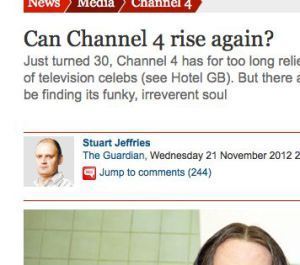
The estimable Stuart Jeffries, who has written scathingly about C4 in the past, has gathered his thoughts on the 30-year-old channel for the Guardian this week, a very good read. Over the years, as both presenter and writer, I’ve been in and out of meetings at all the major broadcasters, including C4, although off the top of my head, I think the only actual programmes I’ve been involved in have been clips shows (nothing wrong with those, of course, although they’ve thankfully dried up).
When I was still paired with Stuart Maconie in the 90s and simultaneously on ITV with the Movie Club and Radio 1 with the Hit Parade, we paid our first visit to C4 at Horseferry Road to pitch our own comedic cultural magazine show (Get Culture!) with a supportive commissioning editor who left the channel about a week later. We learned a valuable lesson that day: you’re only as popular as the current commissioning editor thinks you are.
The late Harry Thompson, whom I interviewed about Peter Cook for Radio 4, and had stewarded The 11 O’Clock Show to fruition, gave me an insight into how C4 then worked: some excitable exec would designate some up-and-coming comedian as “the new face of the channel”, tell them so, wine them and dine them, try them out in a few things, and then tell them that, in fact, they were no longer “the new face of the channel”, because somebody else was. In this, I guess C4 are not so different from the BBC, or ITV, or Sky, who have long been in the business of creating a Hollywood-style “stable” of stars. But unless you have signed a contract, it’s all meaningless.
When Simon and I developed and wrote the 90-minute version of Personal Training for C4, in 2007, we had every reason to believe it was going to air. Instead, it was never shot. You weather such setbacks, or else – as I always say – you get out of the business. When the 10-minute version airs on Sky in the new year, all the agony and the ecstasy will have been worth. (You could conceivably write scripts that are never made forever and live off it. But what kind of life is that? And in any case, unmade scripts will eventually start to work against your professional reputation!)
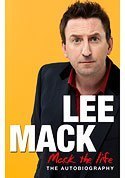
I discovered yesterday that Lee Mack’s autobiography, Mack The Life, has been published in hardback, in time for Christmas. I knew he was writing it, as he tapped me for some clarification about the early days of Not Going Out last year. I look forward to reading it, as I sincerely hope I am at least a footnote. But Not Going Out, as important as it has been for me, professionally, was never my show, and series six – the first without Tim – is being filmed right now, the second series with which I’ll have had no involvement whatsoever. I’m glad it’s still going, although Tim’s absence will be a problem, I suspect. We shall see. I’m out. When you work on a show almost full-time for two series, then as one of a much larger team for two further series, this seriously reduces your annual income. Then, we you are relinquished altogether, that has an even more profound effect on your income. But it’s good to be forced to concentrate on projects of your own. Series six airs in the new year. (Lee and I remain friends, by the way.)
Roll on the end of the year. It’s around now, just before the advent calendar doors start to be folded back, that I always start to take stock of the disappearing year. Has it been an improvement on last year, or the opposite? Have the highs outranked the lows? Have the slaps in the face outweighed the pats on the back? Don’t know yet.

November 20, 2012
There’s her jumper
 I’m sorry, I have a cold. Hopefully it won’t hamper your enjoyment of this week’s Telly Addict, which takes a keen interest in … Sarah Lund’s knitwear in The Killing III on Scandinavia’s BBC4, the portrayal of a fantasy BBC you could really trust in the 1957-set The Hour on BBC2; the tragic trajectory of Nadine Dorries MP on I’m A Celebrity … Get Me Out Of Here! on ITV1; and a bit of prime Gyp Rosetti on Sky Altantic’s Boardwalk Empire, but don’t worry if you’re a spoiler-shy Sky refusenik and are waiting for the box set, it’s a stand-alone clip that has no bearing on the plot, other than Gyp Rosetti is in it.
I’m sorry, I have a cold. Hopefully it won’t hamper your enjoyment of this week’s Telly Addict, which takes a keen interest in … Sarah Lund’s knitwear in The Killing III on Scandinavia’s BBC4, the portrayal of a fantasy BBC you could really trust in the 1957-set The Hour on BBC2; the tragic trajectory of Nadine Dorries MP on I’m A Celebrity … Get Me Out Of Here! on ITV1; and a bit of prime Gyp Rosetti on Sky Altantic’s Boardwalk Empire, but don’t worry if you’re a spoiler-shy Sky refusenik and are waiting for the box set, it’s a stand-alone clip that has no bearing on the plot, other than Gyp Rosetti is in it.

November 15, 2012
Blues after Ceaucescu
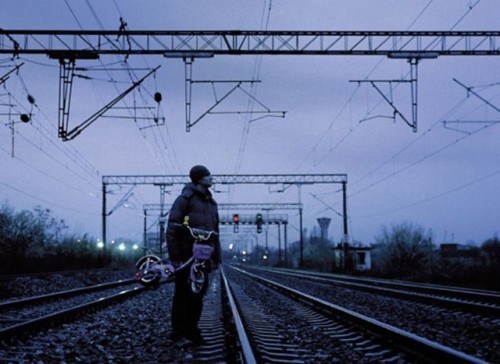
To some of you, it would seem to be a parody of the kind of film I like, but to me, it is the kind of film I like: a three-hour contemporary Romanian film in which hardly anything happens and almost nothing is explained. Aurora is that film, the third from Cristi Puiu, whose second feature The Death Of Mr Lãzãrescu was hugely acclaimed and kicked off what he has called his Six Stories From The Outskirts Of Bucharest, and what critics have called the New Romanian Wave. This is the second of those. I won’t tell you where it is set.
No idea why it’s called Aurora, by the way. This seems to be its international title. (His previous was called Moartea domnului Lãzãrescu in his native land.) Does it refer to the Roman goddess of the dawn? To the astronomical light display? To the fictional planet from Isaac Asimov? The film is very much set on this planet, and very little occurs to suggest gods or astronomy. The characters, embodied by the enigmatic, muttering Viorel (played by Puiu himself), seem pinned to the earth, trapped inside the grey of their immediate vicinity: work, home and transit in between. There were points in this slow, deliberate, precise film, which takes place over two days under colourless skies, where I thought it was simply a case of watching a middle-aged man in Bucharest go through a mental breakdown. (Without giving anything concrete away – which is fairly easy, as Puiu doesn’t give anything concrete away either – Viorel’s initial purchase of a rifle is the only element that seems to raise Aurora above the level of mundane, everyday routine.)
In fact, it’s nothing as melodramatic as that. He has conversations with workmates at some kind of metalworks; conversations with his neighbours in the worn block of flats where he lives, alone, within the stripped walls of his emptied apartment, apparently prepared for “redecoration” that may be a mirage of forward planning; conversations with shop assistants and others in the service industry – a gun shop; a cafeteria; a brightly strip-lit supermarket; a chi-chi fashion outlet that offers a prickly glimpse of middle-class life albeit one that seems out of this man’s reach, ambition or pay-grade – and he basically goes about his day. Divorced, with two daughters, he slowly picks his way through unsatisfactory relationships with his in-laws, the staff at his eldest’s school, and even what appears to be his girlfriend (or a married woman he’s having an affair with), and amid sll this, Viorel emerges as an amazingly full-blooded creation, for all of his communication problems. Credit to director, screenwriter and actor, who are one and the same, after all.
He seems at times unable to give a straight yes or no answer, preferring to stay silent. He’s the kind of guy you might well divorce, although his eldest treats him with respect and does not seem scared of him. He’s something of an incomplete man. This impression is pointed up by Puiu the director, who frames him so that he is literally not all there.

I must admit, a three-hour film is always a challenge, even if it’s action-packed. Aurora is not action-packed, but its lack of action lends extra weight to ordinarily insignificant details. I became fixated on a tiny Tom & Jerry badge Viorel had stuck to the dashboard of his car: the implied western influence on a former Communist country; the sad trace of a time when, perhaps, it was a family car, with kids in the back; an even subtler suggestion of violence. It’s hypnotic, and very difficult not to get involved in, as this man lurks, and runs, and lurks again, and picks things up and puts them down and then picks them up and puts them down again in a different place.
I’ve read good reviews and bad of Aurora, including a one-star decimation in Time Out New York, which I think deemed it a “waste of time“. There is no consensus. It debuted at Cannes two years ago and only now finds an international release, despite Puiu’s reputation after Lãzãrescu. But it does not steal three hours away from you. Not if you relish the privilege to eavesdrop on another culture, another way of life, another daily reality. It’s over 20 years since Ceaucescu was deposed – and executed – ending more than 40 years of Communist rule, during which time a country that had failed to remain neutral in both world wars, and whose part in the defeat of Nazi Germany was not officially recognised by the Paris Peace Conference in 1947, had industrialised and collectivised, thumbed its nose at the Soviets, and endured a police state under its own autocratic megalomaniac. It’s not too fanciful to read all of this 20th century history into a film about a man going about his business in the early 21st. The narrative deliberately defies context, but carries an awful lot of subtext.
I can’t, and won’t, talk about the film’s ending. Even though it’s not an action thriller, a lot happens in the final 20 minutes, by which time you’ve spent 160 minutes on the outskirts of Bucharest, and although resolution is not achieved in a traditional sense, you learn things about Viorel that were up to that point presumed, or simply opaque, like the windows and screen doors we’ve been watching him through.
I’m glad to have seen Aurora. It’s flawed, but it’s worthwhile. Had I seen it on TV, with distractions and a pause button, and not in the isolating dark of a cinema, I may not have been so engaged and absorbed by its minutiae. It is categorically not a waste of time.


Andrew Collins's Blog
- Andrew Collins's profile
- 8 followers



